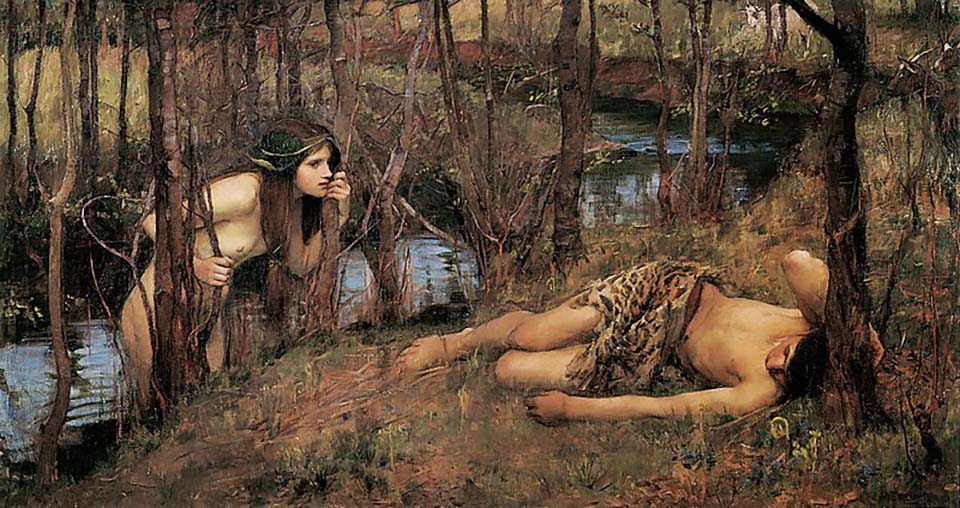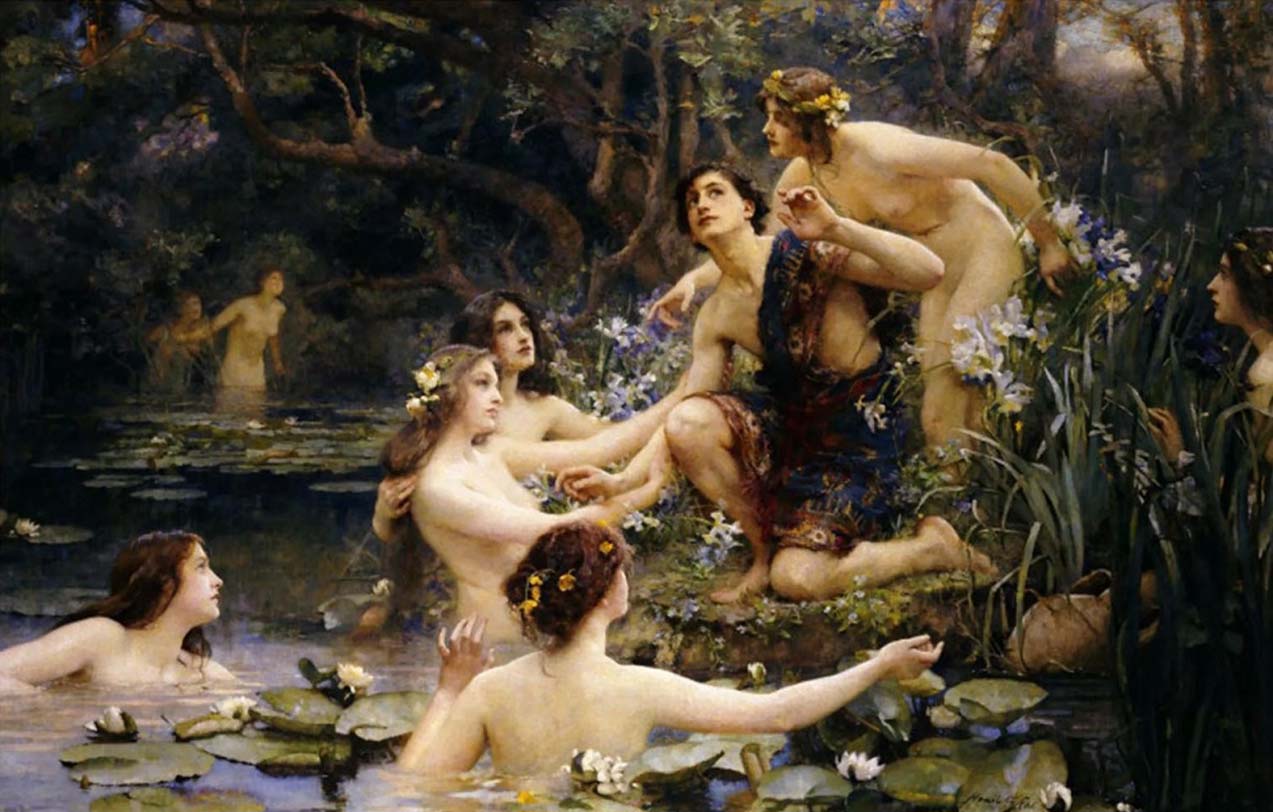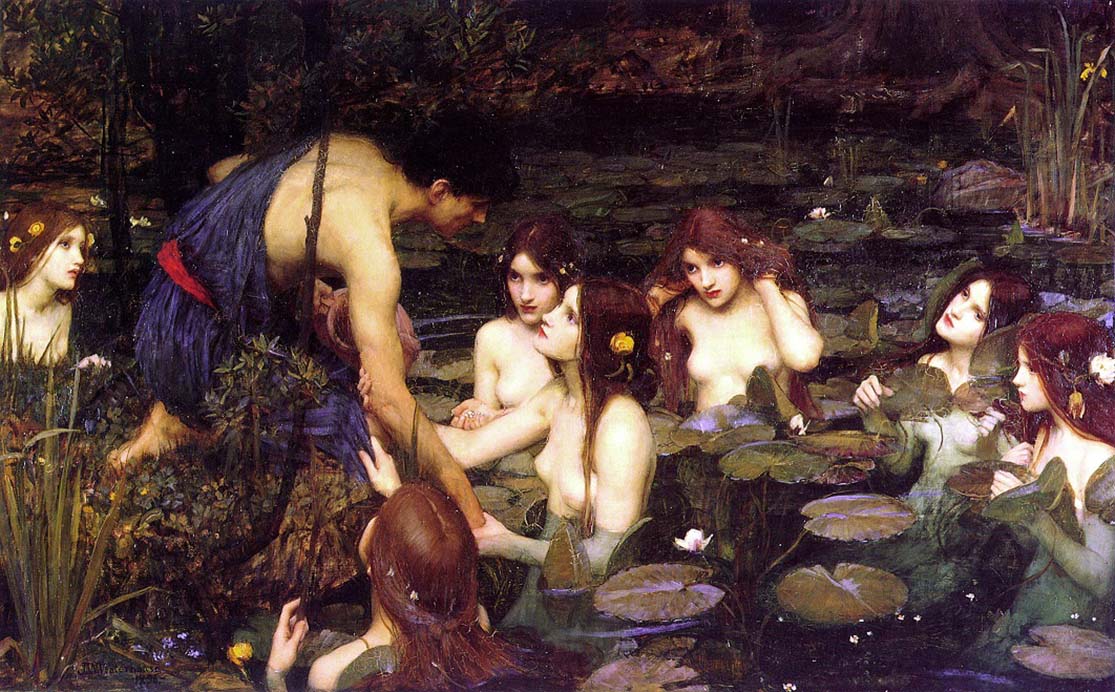Hylas
In classical mythology, Hylas (Ancient Greek: Ὕλας) was a youth who served as Heracles' (or Hercules) companion and servant. His abduction by water nymphs was a theme of ancient art, and has been an enduring subject for Western art in the classical tradition.
In Greek mythology, Hylas was the son of King Theiodamas of the Dryopians and the nymph Menodice (daughter of Orion).
In some accounts, his father was Euphemus or King Ceyx of Trachis.
Hylas though would soon become fatherless for Theiodamas would die at the hands of the Greek hero Heracles. Commonly it was said that Heracles killed one of Theiodamas’ prized ploughing bulls when the hero was hungry, and Theiodamas died when he sought retribution against Heracles.
Some say though that Theiodamas died in battle when Heracles and his friend Ceyx led an army against the Dryopians.
It would not have been unusual for Heracles to have killed Hylas the son of Theiodamas when the king was killed, for it would prevent future acts of revenge, but instead Heracles decided to take with him, perhaps taken by the beauty of the youth.
Perhaps though, Hylas was not the son of Theiodamas at all for occasionally it was said that Hylas was the son of Ceyx and Alcyone, or of Heracles and Menodice, or Heracles and Melite.
Heracles would make Hylas his arms bearer and Hylas would be taught in the ways of the hero by the greatest of all Greek heroes, and soon Hylas was more than competent with the bow and the spear.
Soon afterwards there was a great gathering of heroes at Iolcus, for Jason had been tasked with bringing back the Golden Fleece from Colchis. It was of course natural for Heracles to be accepted as an Argonaut, but such was the prowess of the Hylas, that he too would soon be numbered amongst the crew of the Argo.
Hylas, and Heracles, though were destined not to reach Colchis.

The Argo would eventually reach Asia Minor, and the ship and crew would stop in Mysia to replenish their water and food stocks.
Heracles would go hunting whilst Hylas sought to refill pitchers of water. Hylas would locate a source of freshwater at the spring of Pegae, and would set about filling his vessels with water. The spring of Pegae was also home to Naiad nymphs, just as every other spring, fountain and lake did.
From the depths of the spring, the Naiads spied the beautiful Hylas as he leant over the surface of the spring. The Naiads decided that this mortal youth should be theirs, and so one Naiad, possibly named Dryope, reached up through the water, and taking hold of Hylas pulled him beneath the surface of the spring, causing Hylas to cry out in surprise.
Another Argonaut, Polyphemus, son of Elatus, heard Hylas cry out, and set out to find Hylas, fearing that perhaps the young man had been attacked by bandits. Polyphemus would encounter Heracles returning from his hunting expedition and the pair fell in together to continue the search.
Search as they may though, Hylas could not be found, and some tell of how the Naiads transformed Hylas’ voice into an echo, so that when Heracles and Polyphemus called out for their comrade, Hylas could but repeat his own name.
Perhaps though Hylas did not wish to be found, for some say that having been made immortal and ageless, Hylas was more than content to spend eternity amongst the beautiful Naiads.
The absence of three of their number had not gone unnoticed by the other Argonauts, but now some of the most favourable winds of their entire journey were blowing. Jason would make the difficult decision to leave Hylas, Heracles and Polyphemus behind, a decision which would bring forth great animosity from Telamon towards Jason. Eventually though, the sea god Glaucus would inform the Argonauts that it was the will of the gods that Heracles was not to continue amongst the Argonauts.
Despite being abandoned in Mysia, Heracles and Polyphemus would continue to search for Hylas but whilst they occasionally thought they heard their own names being called out, the calls were so faint that their source could never be located.
Eventually Heracles would give up the search for Hylas, but Polyphemus remained. Polyphemus would become king of Cius, but would continue to search for his missing comrade until his dying days. Even after the death of Polyphemus the people of Cius would, once a year, look again for Hylas, for it was said that Heracles had threatened to return and destroy Mysia if Hylas was not found.
Hylas was though never found, and so perhaps he lives on today as an immortal amongst the Naiads.

Sources
Homeric Hymn to Apollo, 3.209
Isyllus, Hymn to Asclepius
Pindar, Pythian Ode 3. 5
Ovid, Metamorphoses 2.536 & 596 ff (trans. Brookes More)
Pseudo-Hyginus, Astronomica 2. 40
Diodorus Siculus, Library of History 5. 64. 6
Pseudo-Apollodorus, Bibliotheca 3. 118
Pausanias, Description of Greece 2. 26. 1 - 7
Homer, Odyssey, 12.072
Theocritus, Idylls, 13
Callimachus, Aetia (Causes), 24
Thiodamas the Dryopian, Fragments, 160.
Hymn to Artemis
Apollonios Rhodios, Argonautika, I. 1175 - 1280
Apollodorus, Library and Epitome 1.9.19, 2.7.7
Sextus Propertius, Elegies, i.20.17ff
Ovid, Ibis, 488
Gaius Valerius Flaccus, Argonautica, I.110, III.535, 560, IV.1-57
Hyginus, Fables, 14
Argonauts Assembled
Philostratus the Elder, Images, II.24 Thiodamas
First Vatican Mythographer, 49. Hercules et Hylas
"Greek Legends and Myths"













